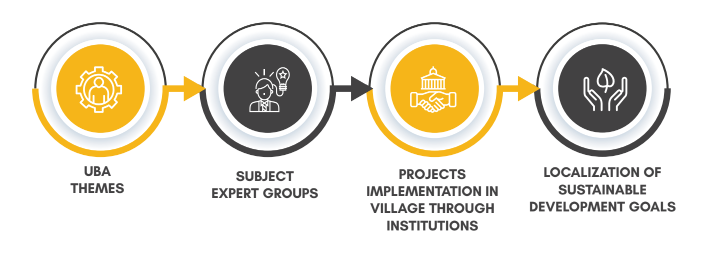Organizational Structure
Sponsoring Ministry–MoE
The Ministry of Education(MoE), Government of India, has launched the program of Unnat Bharat Abhiyan (UBA), a national program with the vision to involve the professional and other higher educational institutions of the country for the sustainable development of villages.
National Steering Committee (NSC)
An empowered NSC has been constituted by Ministry of Education for guidance and monitoring of the program at national level and to provide direction and requisite thrust to the programme.
National Executive Committee (NEC)
National Executive Committee to take policy-related decisions for Unnat Bharat Abhiyan.
National Coordinating Institute (NCI)
The Indian Institute of Technology Delhi is the National Coordination Institute (NCI) for the scheme. The NCI is responsible for the effective execution and monitoring of the programme.
National Subject Expert Advisory Committee (NSEAC)
NSEAC was formed for the better and effective interventions of technologies in the villages. The main objective is to make an impact on the ground and deliver the results of the program to the people in rural areas through desired technical, management, social interventions.
Regional Coordinating Institutions (RCIs)
To facilitate, guide and monitor the activities of the participating institutions (PIs), 45 Regional Coordinating Institutions (RCIs) are identified on the basis of their earlier experience and infrastructural competence etc. The responsibilities of RCIs Are:
- RCIs will act as nodal centres for promoting & facilitating UBA network in their region.
- RCIs will groom PIs of the region to design innovative solutions for the challenges in the village.
- RCIs is responsible to facilitate, guide and monitor the activities of Participating Institutions in
- their region.
Participating Institutions(PIs)
Any Higher Educational Institute willing to work with Unnat Bharat Abhiyan, can join the programme by applying online on UBA website. The responsibilities of PIs Are:
- As part of the programme, it is mandatory to identify/select five villages in consultation with
- the district collectors for the activities under the UBA.
- Institutions are expected to do field studies, study the implementation of government
- schemes, and facilitate their better implementation so that they meet their objectives.
- PIs should engage interested faculty members & students, NSS and other bodies of the
- institutes engaged in community development activities.
- The selected PIs will work with state government, district authorities / PRIs / other institutions
- and non-governmental bodies, for arriving at suitable solutions for improving the social and
- economic well-being of the rural communities.
Subject Expert Group Institutions (SEGs)
The Subject Expert Groups provide operational expertise sought by the institutions engaged in the rural work. The responsibilities of SEGs are:
- To act as a think tank and technical expertise resource.
- To provide guidance on the vision, strategies and tentative roadmap in the subject area.
- To provide technology compendium in their Subject Expert area.
- To evaluate and approve new technical solutions submitted by PIs or any other inventors.
- Localization of sustainable development goals and making carbon-neutral gram panchayat.
- The main objective is to make an impact on the ground and deliver the results of the program
- to the people in rural areas through desired technical, management, and social interventions.



